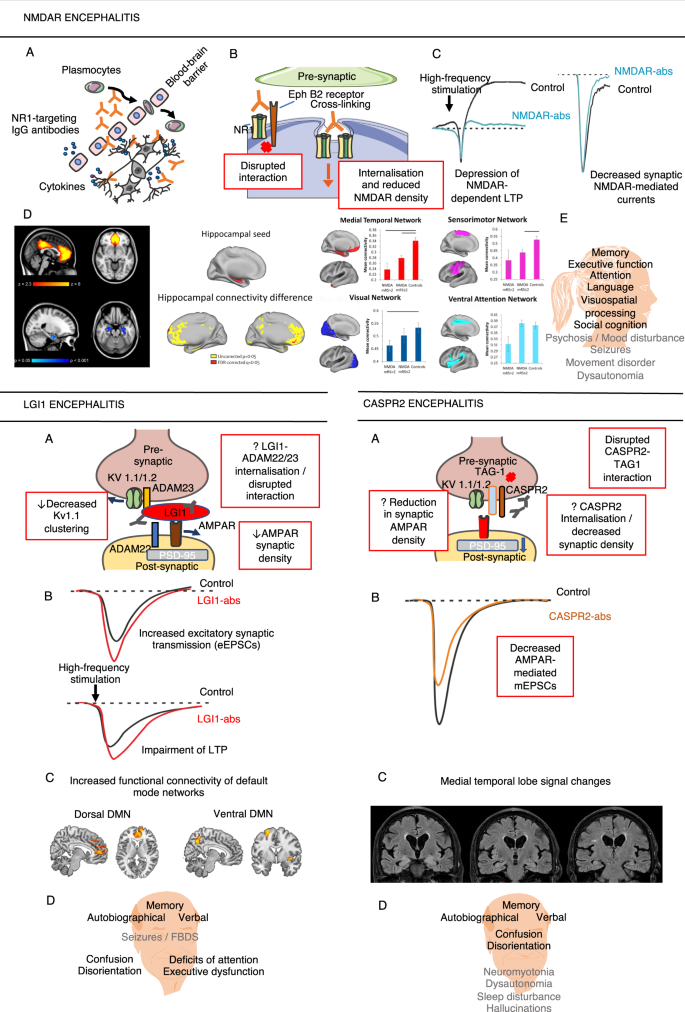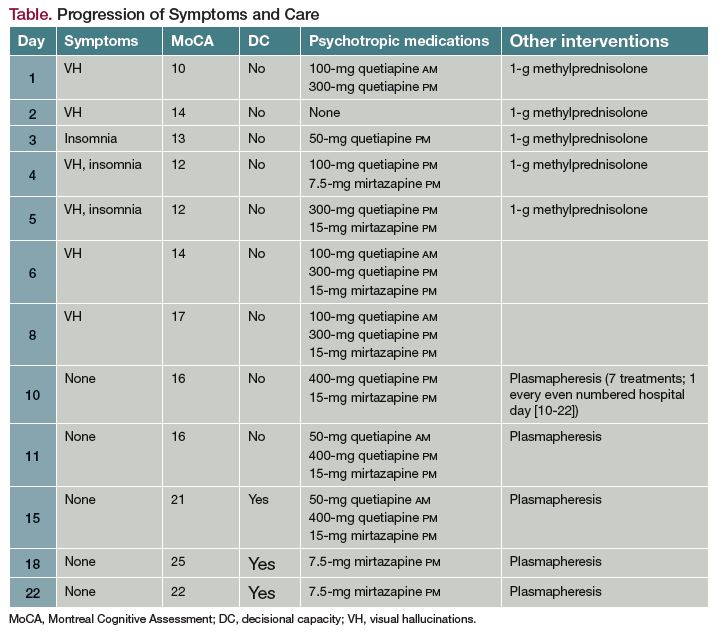Anti-N-methyl-d-aspartate NMDA receptor encephalitis is a form of encephalitis occurring primarily in women and associated with antibodies against NR1 or NR2 subunits of the NMDA receptorAs a potentially treatable differential for symptoms and signs seen in neurology and psychiatric clinics clinicians practising across the lifespan should be aware of this form of encephalitis. NMDA receptor encephalitis and other antibody-mediated disorders of the synapse.

Treatment And Prognostic Factors For Long Term Outcome In Patients With Anti Nmda Receptor Encephalitis An Observational Cohort Study The Lancet Neurology

Cognitive Impact Of Neuronal Antibodies Encephalitis And Beyond Translational Psychiatry

Anti Nmda Receptor Encephalitis With Visual Hallucinations And Cognitive Impairment
Reduced GABA-A receptor activity in the right lateral orbitofrontal and right posterior parietal cortex which would explain.
Anti nmda receptor encephalitis treatment. 6 2017 Anti-NMDA receptor encephalitis is an inflammatory disease that affects the central nervous system. Band 7 Dezember 2008 S. New Treatment for a Rare Form of Encephalitis Jan.
Autoimmune encephalitis is a group of rare neurological condition causing inflammation of the brain. Panariello A Bassetti R Radice A et al. However existing criteria for autoimmune encephalitis are too reliant on.
Autoimmune encephalitis signs can include catatonia psychosis abnormal movements and autonomic dysregulationAntibody-mediated anti-N-methyl-D-aspartate-receptor encephalitis and Rasmussen encephalitis are examples of autoimmune encephalitis. This page from Great Ormond Street Hospital GOSH explains the causes symptoms and treatment of autoimmune encephalitis and where to get helpIt can follow on from a minor infection such as a cold and is the result of the immune system becoming mis-programmed. Josep Dalmau and colleagues at the University of Pennsylvania in 2007.
TYPES OF AUTOIMMUNE ENCEPHALITIS. Steve Roach in conjunction with the team of Associate Editors heads an. Anti-NMDA receptor encephalitis in a psychiatric Covid-19 patient.
Although anti-NMDA receptor encephalitis is a serious life-threatening disease the majority of patients who receive prompt diagnosis and treatment go on to make a good recovery. Monti G Giovannini G Marudi A et al. This is then typically followed by psychosis which presents with false beliefs delusions and seeing or hearing things that others do not see or hear hallucinations.
Anti-NMDA receptor encephalitis is a neurologic disease first identified by Dr. If the brain protein is the N-methyl-D-aspartate NMDA receptor the condition is termed NMDAR antibody encephalitis or anti-NMDAR encephalitis. Anti-NMDA receptor encephalitis is the most common autoimmune form and is accompanied by ovarian teratoma in 58 percent of affected women.
The NMDA receptor is a protein in the brain that helps control thoughts mood and movements and therefore antibodies against NMDA receptors are likely to have an important role in altering these functions. The disease was given a name in 2007. Therefore clinical correlation must be strongly considered.
Anti-NMDA receptor NMDAR encephalitis is an autoimmune disorder in which the use of immunotherapy and the long-term outcome have not been defined. AETIOLOGY AND PATHOPHYSIOLOGY. Anti-N-methyl D-aspartate NMDA receptor anti-NMDAR encephalitis caused by immunoreactivity against the NMDA receptor 1 NR1 subunit of the NMDA receptor is one of the most common autoimmune encephalitides first described in 2007 by Dalmau and colleagues in which psychiatric and neurologic symptoms were found in women with ovarian teratomas1 The condition.
Herpes simplex encephalitis is a type of infectious encephalitis which happens when herpes simplex virus HSV enters the brain. Amano E Machida A Kanazawa N Iizuka T. Autoimmune encephalitis occurs when a persons own antibodies or immune cells attack the brain.
Had Cahalan had the disease a few years prior there would have been no diagnosis to give her. That in turn can cause psychosis. Usually it begins with flu-like symptoms followed by neurological deterioration which may include personality and behavioural changes seizures weakness and difficulties in communication.
Case series and analysis of the effects of antibodies. Cerebrospinal fluid MOG-antibodies in anti-NMDA receptor encephalitis with leptomeningeal enhancement. De Berardis D et al 2020 Adjunctive vortioxetine may be useful and well-tolerated in stage I.
Anti-NMDA receptor encephalitis or NMDARE for short. Anti-NMDA receptor encephalitis presenting as new onset refractory status epilepticus in COVID-19. Countries including Japan Slovakia Bulgaria India Egypt South Africa Zimbabwe Bolivia Peru Argentina.
Encephalitis is a severe inflammatory disorder of the brain with many possible causes and a complex differential diagnosis. Ivermectin is remarkably effective in prophylaxis for Covid prophylaxis 86 fewer cases and treatment -68 fewer deaths. The journals editor E.
The 2016 Cotzias Lecture. Autoimmune encephalitis also known as autoimmune limbic encephalitis is an antibody-mediated brain inflammatory process typically involving the limbic system although all parts of the brain can be involved. Case series and analysis of the effects of antibodies.
Anti-NMDA receptor IgG antibody is found in a subset of patients with autoimmune limbic encephalitis and may occur with or without associated tumor. Antibodies may target specific proteins or receptors in the brain which determine the type of autoimmune encephalitis. Decreasing antibody levels may be associated with therapeutic response.
Advances in autoimmune encephalitis research in the past 10 years have led to the identification of new syndromes and biomarkers that have transformed the diagnostic approach to these disorders. It has proven to be very safe. It is an autoimmune disease where the body creates antibodies against the NMDA receptors in the brain.
Autoimmune encephalitis can be divided broadly into two groups based on whether or not antibodies are the result of an underlying tumor. People are also often agitated or confused. Pediatric Neurology publishes timely peer-reviewed clinical and research articles covering all aspects of the developing nervous systemPediatric Neurology features up-to-the-minute publication of the latest advances in the diagnosis management and treatment of pediatric neurologic disorders.
Anti-NMDA receptor encephalitis is a type of brain inflammation caused by antibodies. Early symptoms may include fever headache and feeling tired. We aimed to assess the presentation of the disease the spectrum of symptoms immunotherapies used timing of.
Neurology 87 24712482 2016. Recovery is generally slow and may occur over months or even years. The neurobiology of catatonia is believed to originate in disturbances in GABA glutamate and dopamine signalling which are hypothesised to underlie the behavioural motor cognitive and affective symptoms of catatonia Northoff 2002.
The Lancet Neurology. The theory is that the virus causes so-called anti-NMDA-receptor encephalitis an autoimmune reaction that causes brain inflammation. A real-world chart review 32 patients showed that adjunctive vortioxetine to patients with SSRI treatment-resistance showed a response in 417 and remission in 33 of individuals.

Anti Nmdar Encephalitis Brain Inflammation Symptoms Treatments

Summary Of Treatments For Selected Symptoms Of Anti Nmdar Encephalitis Download Table
Anti Nmda Receptor Encephalitis

Clinical Manifestations Of Anti Nmdar Encephalitis In Adults And Children Download Table
3

Clinical And Imaging Characteristics Of 16 Patients With Autoimmune Neuronal Synaptic Encephalitis

Neurocritical Care For Anti Nmda Receptor Encephalitis Sciencedirect

Autoimmune Encephalitis Emcrit Project
